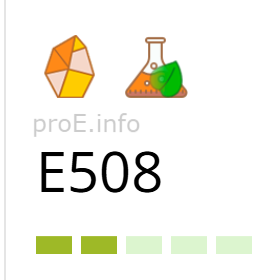
Other names for the additive (synonyms)
General Information
Additive E508 — potassium chloride is an inorganic compound, the potassium salt of hydrochloric acid with the chemical formula KCl. In the food industry, it is used as a thickener, firming agent, and stabilizer.
In nature, potassium chloride is found in the form of minerals such as sylvite (KCl) and carnallite (KCl·MgCl₂·6H₂O), which are extracted from potash ore deposits.
The main industrial production methods of potassium chloride are:
- halurgical method — based on differences in solubility of salts with changing temperature, allowing the extraction of pure KCl from natural brines;
- flotation method — separation of mineral particles based on their ability to adhere to the phase boundary in aqueous media using foaming agents;
- chemical synthesis — reaction of potassium hydroxide (KOH) with hydrochloric acid (HCl) followed by crystallization of the product.
The resulting product is a white crystalline substance, odorless, highly soluble in water, and practically insoluble in alcohol.
Effects on the Body
Benefits of additive E508
Potassium chloride is an important source of potassium ions, essential for maintaining water-electrolyte balance, proper muscle function (including the heart muscle), and transmission of nerve impulses. In the human body, potassium salts are easily absorbed from the digestive tract and excreted by the kidneys.
In medical practice, potassium chloride is used in small doses to correct hypokalemia (potassium deficiency in the blood) and to support cardiac muscle function.
Risks of additive E508
According to the European Food Safety Authority (EFSA), additive E508 does not possess carcinogenic, genotoxic, or other harmful properties when consumed within acceptable levels. In its 2016 evaluation, EFSA concluded that potassium chloride is a physiologically necessary substance and does not require the establishment of an Acceptable Daily Intake (ADI).
However, excessive intake or impaired kidney function may lead to hyperkalemia (elevated potassium levels in the blood), which can cause cardiac arrhythmias and other adverse effects. Therefore, additive E508 should be used with caution in individuals with kidney diseases or cardiovascular conditions.
Uses
In the food industry, additive E508 serves the following purposes:
- component of “low-sodium salt” — used in blends with sodium chloride to reduce overall sodium content in products;
- acidity regulator and source of potassium ions;
- gelling agent and texture stabilizer in meat products, cheeses, and salt substitutes;
- anti-caking agent in dry mixes and spices;
- maintains osmotic balance in marinades and brines.
Outside the food industry, potassium chloride is used in:
- agriculture as a potassium fertilizer (potash);
- chemical industry for the production of potassium hydroxide via electrolysis;
- optoelectronics — for the creation of holograms and optical crystals;
- pharmaceutical industry for the manufacture of infusion solutions;
- in some U.S. states, it is used as a component of lethal injections for capital punishment — the action of potassium chloride aims to stop heart activity by inducing lethal hyperkalemia.
Legal Status
Additive E508 is approved for use in the food industry in Ukraine, the European Union, and the United States. In Europe, potassium chloride is classified as a safe food additive without the need to establish an Acceptable Daily Intake (ADI not specified). In the United States, additive E508 is included in the list of substances Generally Recognized As Safe (GRAS).
In the Codex Alimentarius (STAN 192-1995), potassium chloride is listed as food additive INS 508 and is authorized for use as an acidity regulator, anti-caking agent, and stabilizer in various food categories.